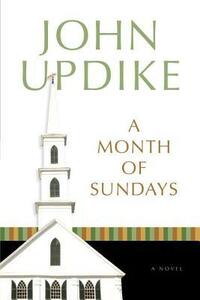Take a photo of a barcode or cover
funny
dark
funny
slow-paced
Plot or Character Driven:
Character
Strong character development:
No
Loveable characters:
No
Diverse cast of characters:
No
Flaws of characters a main focus:
Yes
I selected this for my "U" choice for A-to-Z Authors group and had started (but paused) reading it before John Updike died. Once he died, I forced myself to keep reading this book just so I could check it off my list. I don't think the description did an adequate job of describing what the book would actually be about, and I found it hard to follow. Perhaps that's because Updike's vocabulary is so extensive...I probably should have read it along with a dictionary. There were some chapters that captivated me -- particularly the description of being in the desert. Since I live in Arizona and have resisted the desert for most of my life, this part touched me. It reminded me of reading Abbey's Desert Solitaire in college, after a years-long debate with a high school friend over whether the desert can be peaceful. I conceded the argument after reading Abbey's book, and Updike's section on desert wonders confirms that decision.
Updike is a perfect combination of poignant, realistic, and hilarious.
Very interesting delve into the life of a priest. Kind of makes you think about the different perspectives of the religious leaders of our world. There were times I really wanted to hate the main character, Tom, but he was just so honest about his thoughts and actions that it was hard not to like him. It's cool that it was in the form of Tom's diary and he wrote for someone other than himself which made it different than usual diaries. He wrote as if there was a secret reader that kind of ended up getting you more involved into the story.
A big ol' "meh" from me. It was too sexual and I didn't find the main character redeeming at all. Maybe if I paid more attention to the theology (or listened to my friends when they said it wasn't worth it), it would have been better.
The Rev. Tom Marshfield doesn't understand the ministry as I do. It's interesting to read this reflection on ministry in the 1970's before the common understanding of professional boundaries. And yet, his mistakes are familiar to the failings of many ordained leaders today. What terrifies me is how he supports his actions through four sermons and journal reflections theologically. Barth supports his model of ministry while he abhors the doubt introduced by Tillich and others. This book leaves me wondering if a little bit of doubt in the ministry is actually a really good thing.
A strong book in Updike's Hawthorne trilogy, though it betrays its Nabakovian echoes a little too frequently. Still, recommended for verbal pyrotechnics and shrewd sense of humor.





